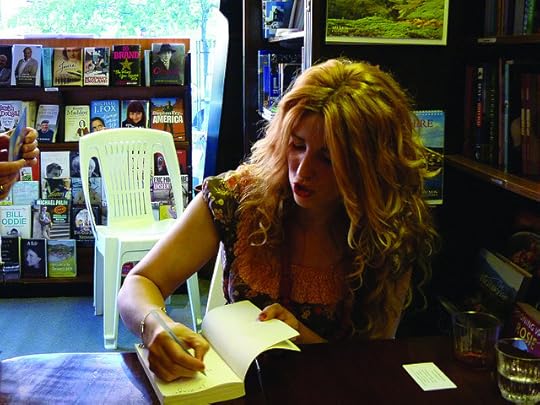Kate Forsyth's Blog, page 57
May 12, 2013
BOOK REVIEW: 'The Darling Strumpet' by Gillian Bagwell
Title:
The Darling Strumpet: A Novel of Nell Gwynn, Who Captured the Heart of England and King Charles II
Author: Gillian Bagwell
Publisher: Berkley Trade
Age Group & Genre: Historical Novel for Adults
The Blurb: A thrilling debut novel starring one of history's most famous and beloved courtesans.
From London's slums to its bawdy playhouses, The Darling Strumpet transports the reader to the tumultuous world of seventeenth-century England, charting the meteoric rise of the dazzling Nell Gwynn, who captivates the heart of King Charles II-and becomes one of the century's most famous courtesans.
Witty and beautiful, Nell was born into poverty but is drawn into the enthralling world of the theater, where her saucy humor and sensuous charm earn her a place in the King's Company. As one of the first actresses in the newly-opened playhouses, she catapults to fame, winning the affection of legions of fans-and the heart of the most powerful man in all of England, the King himself. Surrendering herself to Charles, Nell will be forced to maneuver the ruthless and shifting allegiances of the royal court-and discover a world of decadence and passion she never imagined possible.
What I Thought:
I’ve always loved books about Charles II, and have often wondered why that period of history is not as well-thumbed as the preceding Tudor period. The Stuart era was just as bloody, turbulent, passionate and packed with fascinating characters, if not more so.
One character I always liked the sound of was Nell Gwyn, one of Charles II’s mistresses, and so I was eager to read this novelisation of her life by Gillian Bagwell, an American author who has a background in acting, theatre directing, and artistic director of the Pasadena Shakespeare Company. The Darling Strumpet is her first novel, and is an extremely accomplished debut.
The story begins when Nell is only ten years old, selling oysters on the streets of London. She is poor, dirty, and very hungry.
On that very day Charles II is making his triumphant return to London, after years of exile on the Continent while Oliver Cromwell ruled England as its Lord Protector. The city is seething with excitement, and Nell is caught up in the thrill, particularly when she sees the king and his beautiful and gorgeously dressed mistress, Barbara Palmer. Her empty belly, however, will not be forgotten and impulsively she sells her virginity to a strange boy in return for enough coin to buy a hot pie and a knot of ribbons.
The matter-of-fact way in which Nell does this is a telling detail, for in the world she lived in prostitution was one of the few career choices a young girl could make. This choice sets her towards employment in a bawdy house, where her elder sister already works. These early scenes are faced truthfully and unflinchingly, bringing the dark underbelly of 17th century London vividly to life.
The king soon re-opens all the theatres that were shut under Cromwell’s Puritan rule, and Nell is drawn irresistibly to the glamour and drama of the dramatic world. She begins as an orange seller, where she first attracts the King’s attention. Soon she is treading the boards herself, and, with her beauty, audacity and wit, soon becomes a smash hit. She is torn between love and ambition, but her desire to lift herself as far away from the gutter as possible wins out and she becomes the mistress of a series of increasingly wealthy and influential noblemen. It is not long before she sets her sights on the King.
Once she has him in her bed, though, she needs to keep him there, and the King is notoriously fickle. They have two sons together, but the King has other sons by other mistresses, and Nell has to use all her wits and charm to keep what she has gained.
The book ends with Nell’s death, so it is truly a biographical novel, with the author’s imagination providing plenty of drama and intrigue to keep the reader’s absorption in the story. In this way, it has more of an episodic structure than most historical novels, but Gillian Bagwell writes with such aplomb that the lack of a strong climax and resolution does not matter at all. I enjoyed it very much, loving the mix of fiction and historical fact, romance and heartbreak. I was particularly impressed with the creation of the colourful world of 17th Century England. Not just the London setting, but the attitudes and mores of the times all ring true. Gillian Bagwell has done her research and wears it lightly. I’d really recommend this for anyone who loves historical fiction, or epic romance.
[image error]
Gillian Bagwell's website
If you enjoyed this review, you might also like my reviews of:
'The Lady's Slipper' by Deborah Swift here
'Vienna Waltz' by Teresa Grant here
'The Raven's Heart' by Jesse Blackadder here
May 10, 2013
WRITING ADVICE: Overcoming Writer's Block
Today I'm going to talk about writer's block.
It's a question writers get asked a lot: 'What do you do when you get writer's block?'
Well, the truth of the matter is, I've never had writer's block. Not the way most people mean it. They have an image of a writer sitting staring at an empty page, scribbling or writing a few words, then balling up the page and throwing it at a wastepaper bin.
Do I ever have trouble getting the words out? Sometimes.
Do I ever get blocked, not sure what to write next? Often.
Have I ever been unable to solve those problems and kep on writing? Never.
It's because I have tricks and techniques to keep the words flowing. I get up, move around, think through my problem logically. I ask myself questions. I do some more research or reading. I brainstorm and mind-map. I go for a long walk by the ocean, etting my mind drift free. I force myself to put words down, any words, so long as I'm dealing with the problem. What am I trying to say? I might type. What is this scene about? Where is it set?
Gradually answers will come to me.
Here is one of the most striking quotations I've ever read about writer's block. It was written by Joseph Conrad, who wrote 'Heart of Darkness"
"I sit down religiously every morning, I sit down for eight hours every day - and the sitting down is all. In the course of that working way of eight hours I write three sentences which I erase before leaving the table in despair. Sometimes it takes all my resolution and power of self-control to refrain from butting my head against the wall. I want to howl and foam at the mouth but I daren't do it for fear of waking the baby and alarming my wife. After such crises of despair I doze for hours, still held conscious that there is that story that I am unable to write. Then I wake up, try again, and at last go to bed completely done up. So the days pass and nothing is done. At night I sleep. In the morning I get up with that horror of that powerlessness I must face through a day of vain efforts....
I seem to have lost all sense of style and yet I am haunted by the necessity of style. And that story I can't write weaves itself into all I see, into all I speak, into all I think, into the lines of every book I try to read. ...I feel my brain. I am distinctly conscious of the contents of my head. My story is there in a fluid - in an evading shape. I can't get hold of it. It is all there - to bursting, yet I can't get hold of it any more than you can grasp a handful of water....
I never mean to be slow. The stuff comes out at its own rate. I am always ready to put it down...the trouble is that too often, alas, I've to wait for the sentence, for the word... The worst is that while I'm thus powerless to produce, my imagination is extremely active; whole paragraphs, whole pagges, whole chapters pass through my mind. Everything is there: descriptions, dialogue, reflection, everything, everything but the belief, the conviction, the only thing needed to make me put pen to paper. I've thought out a volume a day till I felt sick in mind and heart and gone to bed, completely done up, without having written a line. The effort I put out should give birth to a Masterpieces as big as mountains, and it brings forth a ridiculous mouse now and then."
The very fact that Joseph Conrad was able to write so much, and so movingly, shows that he doesn't truly have writer's block. All he is missing is "the conviction, the belief". In other words, faith in himself.
Faith in yourself and your story and your style is something no-one else can truly give you. You need to find it yourself.
[image error]
May 9, 2013
SPOTLIGHT: The story behind how I first got published
I’ve always wanted to be a writer – it’s the only thing I’ve ever wanted to be.

A novel I wrote when I was 15
All through my childhood I wrote many poems and novels, and sent out my first manuscript when I was sixteen – it was handwritten, in my very childish handwriting, on loose foolscap pages. I didn’t know any better! Well, I didn’t have a typewriter and computers were barely invented. It was rejected, of course, but came back with a lovely letter saying that I clearly had talent and must keep writing.
So I did. I laboured over a magic realism novel all though my early 20s, while working as a journalist, and began to have poems and stories published. I sent out my novel a few times, and it was almost published three times, but fell through every time, much to my despair.
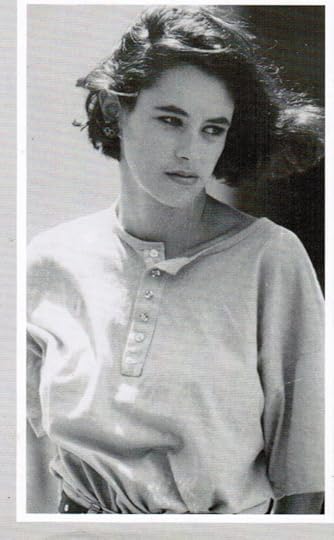
Me in my 20s
At the age of 25 I had a quarter-life crisis. I decided to give myself five years, to pour all my energy into getting a book published, but that I’d have to reassess my life if I couldn’t get published by the age of 30.
I quit my job as a journalist and began freelancing to support myself, and I applied to do my Masters of Arts in Writing, using the magic realism novel I had been working on as my thesis.
I began writing the first draft of Dragonclaw while I was studying for my first year exams, probably in reaction to the “fictive discourses” we were told to construct in our writing classes. About 50,000 words into the first draft, I sent off a few sample chapters to Gaby Naher at Hickson Associates.
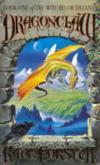
She came back the next day, saying she loved it, and when could I get her a complete manuscript? I wrote madly for the next few months (practically ignoring my studies and work commitments).
I finished the first draft, she put it up for auction, and I signed with Random House by the end of the month. This made me particularly happy, since it was two days before my 30th birthday.
I made my deadline by a whisker!
Dragonclaw has gone on to be sold in the US, Germany, Russia, and Japan, and I have been a full-time writer ever since.
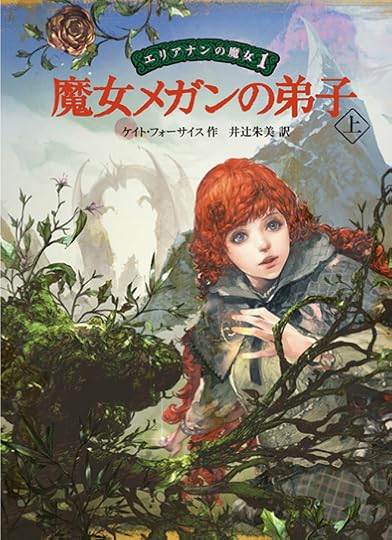
BITTER GREENS: Charlotte-Rose de la Force in her own words
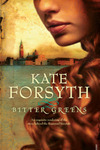
When I was researching the life of Charlotte-Rose de la Force, the real life heroine of my novel 'Bitter Greens', my translator Sylvie Poupard-Gould found a description she had written of herself, one of the few pieces left of her own writing.
Here it is:
“If I wished to create a flattering self portrait, as one ordinarily does, and that I wished to infuse it with as much wit as possible, [I would say]
Never would the much celebrated Helen have had such sweet attributes,
Nor the glory of Niquee caused such a stir.
How many lovers would I have defeated by my charms!
I would renew all our old Paladins - I alone would remake their destinies,
And there would be such a display of arms!
You have to admit, my dear Prince, that things only have the value which we believe them to have, and that I could say, for instance, that I have the loveliest height in the world, that height with which poets often endow their Venus.
It seems to me that I have read somewhere in Homer that She had black eyebrows and eyes - I am in possession of these very same ones. Eyes that we ascribe to the Mother of Love must surely be beautiful: Mine are as such- they say that they are touching, and that never a gaze was so full of charm... I have small and well made feet; my legs, my chest and my hands are rather beautiful. My hair is plentiful, and of the same shade as my eyes. My mouth is red, my teeth fair and I look youthful,
A rose complexion,
Hiding other secret delights,
Which are made of such things that we know but of which we cannot speak...
Isn’t it true then, my Prince, that I have just described the most pleasant beauty conceivable?
All that I have just said is true, and so we must stop here in order to delight those who have not yet laid eyes on me- send this portrait to foreigners, enchant nations and sing my future glory!
However, if I am to remain loyal to this austere sense of truth that rules me, I must confess that, far from being beautiful, I am only just pretty in the eyes of those who love me- who knows what I must look like to those who are indifferent!
All that I have said is true, but there are unpleasant consequences. My nose is not beautiful, my cheeks are high, I have a large mouth and facial features that could do with being more regular. It is almost certain that I am not attractive at first sight, but that with time, one gets used to me. So, to come back to my original point, I look cold, which may give me a distinguished air. I do not seek to attract, because it so happens that very few new people attract me; in this, I am different from other ladies, and like to concentrate my energies on that which pleases me:
To see him, to love him and to remember him
To look after only him
Of the object of my affections
My soul will never tire
I am absolutely the enemy of all constraints, even though my life is one perpetual constraint.
Although I am the mistress of my words and of my actions, of my appearance I am not. I change faces frequently, depending on the mood I am in. Sadness leaves a horrible impression, pride and contempt show too much and do not sit well, languor seems touching, but it is happiness and gaiety which open me up and suit me best. All passions are clearly reflected in my eyes (...) they have a beautiful language for those who wish to listen.
I was born independent and haughty, craving glory to excess. It is also from this trait that I have drawn the strength not to be defeated by adversity. The greatness of my courage allows me to defeat all that I find ill; it allows for a display of resolve that is above my gender and that counters the most outrageous attacks of fortune.
My life is an ongoing philosophy, a living morality. I am extremely fair; I know neither resentment nor the satisfaction of revenge. The misfortune of my enemy triumphs over my anger, and therefore, there is no duty that does not benefit from my generosity.
Whilst I fear malicious gossip, I do not dread fair criticism. True to my virtue, I would much less forgive myself a misdemeanour than others. I am hard on myself and so always look to correct myself- I look for my own approval and do not give it lightly.
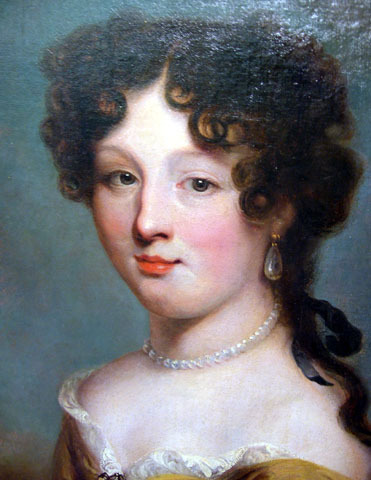
This is not a portrait of Charlotte-Rose, but of an anonymous 17th century lady at the court of Louis XIV. I used it, however, to help me visualise what Charlotte-Rose may have looked like.
If you liked this blog, you may like to read Seven Fascinating Things I Learned While Writing 'Bitter Greens' and The Facts Behind the Fiction of Charlotte-Rose de la Force's life
And please leave a comment! I love comments!
April 25, 2013
INTERVIEW: Toni Jordan, author of 'Nine Days'
I absolutely adored Toni Jordan's book Nine Days, and I was thrilled for her when it was recently chosen by Australia’s independent booksellers as Novel of the Year.
On collecting her award, Toni said:
[image error]
"Nine Days is a novel with nine first-person narrators and a mixed-up chronology.
It’s not an easy book to explain. If it wasn’t for the support of independent booksellers who took the time and trouble to read it and like it and put it in people’s hands, I’d be stuffed. It’s been that way since the beginning of my writing career: when I wrote my first novel, I had no public profile, no ‘platform’. I’d never been on Big Brother and I’d never slept with a footballer.
My first novel, Addition, was a romantic comedy about a woman with OCD. OCD is not normally considered romantic or funny. Lucky for me, independent booksellers love books and they love Australian writing and they give books like mine a chance. I’m very grateful for their faith and support. I wouldn’t have a career without them."
[image error]
Here Toni answers my usual raft of questions with all her trademark humour and flair:
Are you a daydreamer too?
Constantly! I've been away with the fairies for as long as I can remember.
Have you always wanted to be a writer?
It honestly never occurred to me until my late 30s. I'd always been a voracious reader of everything, but it seemed that writers were a special breed of person. For a long time I thought that someone like me could never have a job like that.
Tell me a little about yourself – where were you born, where do you live, what do you like to do?
I'm from Brisbane and live in Melbourne now. Other than read (see above), I love being home, cooking and spending time with my husband and my dog, Myron the Wonderwhippet. It's a pretty quiet life.
How did you get the first flash of inspiration for this book?
My publisher first gave me the photo, the one that's on the jacket of Nine Days. He'd kept it for years hoping one day that someone would write a story around it. I stuck it above my desk and looked at it for months, and then one day I just knew who the people were, how they met, and what happened to them.
[image error]
How extensively do you plan your novels?
Not at all! I make it up as I go along. My biggest challenge is to keep my intellectual brain out of the driver's seat so my heart and instinct can take over.
Do you ever use dreams as a source of inspiration?
I can't remember my dreams!
Did you make any astonishing serendipitous discoveries while writing this book?
This book reminded me that the job of a novelist is to find compassion for people.
Where do you write, and when?
I write three days a week, usually Tuesday, Thursday and Saturday. (Maybe because I'm making it up as I go, my unconscious needs a day off in between each writing day.) On those writing days, I start at 9.30am, usually with reading some fiction I admire. Then I write between 1250 and 1500 words. I sit there until it's done (toilet and tea breaks not withstanding).
What is your favourite part of writing?
Dialogue! When I can hear the people talking to each other--that fills me with job and wonderment.
What do you do when you get blocked?
Whenever I try to think it out or force it, I get blocked. I need to feel my way. No analysis, just typing. And no worrying about what happens next.
How do you keep your well of inspiration full?
Reading. Writing a novel seems like an impossible task: perhaps 70,000 words, each one in the right order, with a sensible overarching plot and theme, and people who seem real. It's only by reading other people's work that I'm reminded that it's possible.
Do you have any rituals that help you to write?
I like having my books around me, and my dog to talk to.
Who are ten of your favourite writers?
This changes constantly, but at the moment:
The locals Michelle de Kretser, Carrie Tiffany and Chris Womersley, Peter Temple and JM Coetzee.
And Margaret Attwood, Zadie Smith, AS Byatt, Jonathan Franzen and Hilary Mantel.
[image error]
Michelle de Kretzer
What do you consider to be good writing?
I loathe explanations, and being told something twice. I consider readers to be much more intelligent than most writers assume. I think that good writing makes space for the reader to enter into the story and engage by filling in gaps.
What is your advice for someone dreaming of being a writer too?
Read, read, read. That's how your brain actually learns how to do it: by absorption stories.
What are you working on now?
Gah! Starting is always the most difficult part. Right now, I'm suspecting it's a 60s coldwar spy novel, but because I don't plan or plot, it might yet turn into something completely different.
[image error]
April 23, 2013
WRITING ADVICE: Toni Jordan - On the Difficulties of Writing Historical Fiction
Here she is:
[image error]
Ah, the bliss of ignorance!
So. It turns out that writing historical fiction is hard. (In other news, the Pope is Catholic.)
It’s way harder than writing contemporary fiction. I know this because my first two books, 'Addition' and 'Fall Girl', were contemporary romantic comedies. They were a joy to write and fun to research. It was easy to imagine the characters as people I could meet, living lives that, if things had turned out differently for me, I could live.
[image error] [image error]
My most recent book, 'Nine Days', turned out quite differently from 'Addition' and 'Fall Girl'. For a start, it became clear early on that it wasn’t a romantic comedy. Instead, it was a family saga. OK, I thought. I know families. I can write about them. Then, in the course of writing about families, it became clear that I would have to go back in time to write about generations that had gone before. Large chunks of the book would need to be set in the late 1930s and early 1940s.
At this point, I wasn’t fazed. (The bliss of ignorance.) I wrote 'Nine Days' the same way I’d written my other books: by trying to understand the way different people see the world, and trying to feel compassion and understanding for the choices they make. When I finished the manuscript I sent it to my publisher, as I usually did. The feedback I received, however, wasn’t what I wanted to hear.
Yep. I’d done just about everything wrong. For a start, my geography was wrong. I’d set the book in the Melbourne suburb of Richmond and I’d put bridges and schools in the wrong places and had my characters going in the wrong direction and working in the wrong areas. The social mores I described were wrong. And (and this is the worst bit): the language my characters used was wrong. (One example among many: a keen-eyed novelist friend pointed out that I had my teenage boys hurrying to cricket ‘training’ in 1939. The word ‘training’, as she pointed out, was an Americanism that crept into our language much later. The boys would have gone to cricket ‘practice’.)
[image error]
At this point, I tried to look on the bright side. I had a decent story and good, strong characters. If I had done the required research at the beginning of my writing process, it might have taken much longer, and I might have been distracted by the fascinating process of dipping into history. As it stood, I knew exactly what I needed to find out.
So I dug through Trove, the National Library’s digitised newspaper and magazine project, and immersed myself in language, preoccupations, and even the weather of particular days. I looked at sewage maps and talked to local historians and walked the streets. I visited the school that the characters attended, St Kevin’s College, the staff of which were kind enough to let me look through the archives. I found a number of reference books on early Australian language, and I ran some words past my grandmother (96 and sharp as a tack).
I’m still haunted, though, by the idea I might have made some shocking mistake. Suspension of disbelief in fiction is a tenuous web. The tiniest error might jerk the reader out of the story, and once you’ve lost the trust of a reader it’s near impossible to win it back. As to people who make a habit of this historical business? (I’m looking at you Kate.) All power to them. I’m not sure I’ll be brave enough to climb on that particular ye olde horse again.
[image error]
TONI JORDAN: On the Difficulties of Writing Historical Fiction
Here she is:
[image error]
Ah, the bliss of ignorance!
So. It turns out that writing historical fiction is hard. (In other news, the Pope is Catholic.)
It’s way harder than writing contemporary fiction. I know this because my first two books, 'Addition' and 'Fall Girl', were contemporary romantic comedies. They were a joy to write and fun to research. It was easy to imagine the characters as people I could meet, living lives that, if things had turned out differently for me, I could live.
[image error] [image error]
My most recent book, 'Nine Days', turned out quite differently from 'Addition' and 'Fall Girl'. For a start, it became clear early on that it wasn’t a romantic comedy. Instead, it was a family saga. OK, I thought. I know families. I can write about them. Then, in the course of writing about families, it became clear that I would have to go back in time to write about generations that had gone before. Large chunks of the book would need to be set in the late 1930s and early 1940s.
At this point, I wasn’t fazed. (The bliss of ignorance.) I wrote 'Nine Days' the same way I’d written my other books: by trying to understand the way different people see the world, and trying to feel compassion and understanding for the choices they make. When I finished the manuscript I sent it to my publisher, as I usually did. The feedback I received, however, wasn’t what I wanted to hear.
Yep. I’d done just about everything wrong. For a start, my geography was wrong. I’d set the book in the Melbourne suburb of Richmond and I’d put bridges and schools in the wrong places and had my characters going in the wrong direction and working in the wrong areas. The social mores I described were wrong. And (and this is the worst bit): the language my characters used was wrong. (One example among many: a keen-eyed novelist friend pointed out that I had my teenage boys hurrying to cricket ‘training’ in 1939. The word ‘training’, as she pointed out, was an Americanism that crept into our language much later. The boys would have gone to cricket ‘practice’.)
[image error]
At this point, I tried to look on the bright side. I had a decent story and good, strong characters. If I had done the required research at the beginning of my writing process, it might have taken much longer, and I might have been distracted by the fascinating process of dipping into history. As it stood, I knew exactly what I needed to find out.
So I dug through Trove, the National Library’s digitised newspaper and magazine project, and immersed myself in language, preoccupations, and even the weather of particular days. I looked at sewage maps and talked to local historians and walked the streets. I visited the school that the characters attended, St Kevin’s College, the staff of which were kind enough to let me look through the archives. I found a number of reference books on early Australian language, and I ran some words past my grandmother (96 and sharp as a tack).
I’m still haunted, though, by the idea I might have made some shocking mistake. Suspension of disbelief in fiction is a tenuous web. The tiniest error might jerk the reader out of the story, and once you’ve lost the trust of a reader it’s near impossible to win it back. As to people who make a habit of this historical business? (I’m looking at you Kate.) All power to them. I’m not sure I’ll be brave enough to climb on that particular ye olde horse again.
[image error]
April 21, 2013
BOOK REVIEW: 'Nine Days' by Toni Jordan
Title: Nine Days
Author: Toni Jordan
Publisher: Text Publishing
Age Group & Genre: Historical/Contemporary Novel for Adults
The Blurb:
One family. Nine momentous days. An unforgettable novel of love and folly and heartbreak.
It is 1939 and Australia is about to go to war. Deep in the working-class Melbourne suburb of Richmond it is business—your own and everyone else's—as usual. And young Kip Westaway, failed scholar and stablehand, is living the most important day of his life.
Ambitious in scope and structure, triumphantly realised, this is a novel about one family and every family. It is about dreams and fights and sacrifices. And finally, of course, it is—as it must be—about love.
What I Thought:
I had enjoyed Toni Jordan’s first novel ‘Addition’ enormously, describing it to myself as ‘intelligent chick lit’. I remember mostly its warmth, its wit, and its willingness to be bold and unconventional, all qualities I admire.
I’m not a big reader of ‘chick lit’. I am, however, a huge reader of historical fiction, as you all know – it’s my favourite genre of fiction.
So I got all excited when I heard Toni had tackled a historical novel. I was also curious. How would she go? I wondered. Historical fiction is harder to write than most people realise.
Well, firstly I need say to say I absolutely adored ‘Nine Days’!
But it’s not really historical fiction. Not entirely. It is both historical and contemporary, but it’s not a parallel story, where the past and the present are woven together.
Rather it moves through time, each section describing a single day in the life of a character. Each character is joined by bonds of blood, and love, and fate, and heartbreak. It is almost a collection of short stories, except each section is so strongly tied to each other, and there is a clear, taut narrative thread running through the whole book. It is both linear and non-linear, experimental and highly readable, unconventional, yet filled with compassion. I loved it!
This is one of my top picks of the year and was recently chosen by Australia's independent booksellers as Novel of the Year (well deservedly) – I urge you not to miss out!
[image error]
April 20, 2013
WRITING ADVICE: Twenty Tips on Writing Better
1. Avoid alliteration. Always.
2. Never use a long word when a diminutive one will do.
3. Eschew ampersands & abbreviations, etc.
4. Foreign words and phrases are not apropos.
5. One should never generalize.
6. Eliminate quotations. As Ralph Waldo Emerson said, "I hate quotations. Tell me what you know."
7. Don't be redundant; don't use more words than necessary; it's highly superfluous.
8. Be more or less specific.
9. Understatement is always best.
10. Exaggeration is a billion times worse than understatement.
11. One-word sentences? Eliminate.
12. The passive voice is to be avoided.
13. Don't never use a double negation.
14. Proofread carefully to see if you words out.
15. If you reread your work, you can find on rereading a great deal of repetition can be avoided by rereading and editing.
16. A writer must not shift your point of view.
17. And don't start a sentence with a conjunction. (Remember, too, a preposition is a terrible word to end a sentence with.)
18. Don't overuse exclamation marks!!!
19. Take the bull by the hand and avoid mixing metaphors.
20. Avoid cliches like the plague.
With thanks to Jokes About Writing
April 18, 2013
INTERVIEW: Marina Fiorato, author of ‘The Madonna of the Almonds’
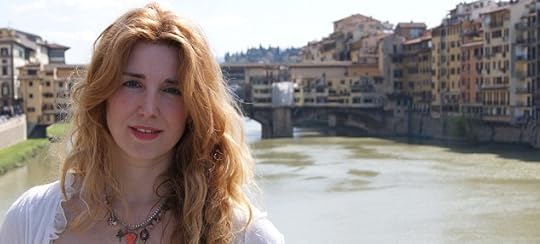
I have read and enjoyed every one of Marina’s books – she’s now one of my favourite authors. Her books all share a vividly described Italian setting, strong plots that illuminate some aspect of Italian history, alluring characters, and gorgeous covers.
Marina’s fascination with Italy comes from being half-Venetian. Although she was born in Manchester and raised in the Yorkshire Dales, she studied history at both Oxford University and the University of Venice, where she specialized in the study of Shakespeare’s plays.
She has also worked as an illustrator, actress and film reviewer, and has designed tour visuals for rock bands including U2 and the Rolling Stones.
She was married on the Grand Canal in Venice, and lives in North London with her husband, son and daughter (with lots of visits to Italy to research her books, the lucky thing!)
Her books are:
The Glassblower of Murano (2008)
The Madonna of the Almonds (2009)
The Botticelli Secret (2010)
Daughter of Siena (2011)
The Venetian Contract (2012)
[image error]
I loved them all, but I was particularly taken with story behind The Madonna of the Almonds and so that is the book I am interviewing Marina about:
Are you a daydreamer too?
Yes - I think it really helps. Sometimes I’ll drift away from modern life and slip back a few centuries - I’ve had lots of good plot ideas from just daydreaming, so I fully recommend it
Have you always wanted to be a writer?
Actually, no - I did when I was at school, then there was quite a long gap when I wanted to be a lawyer, vet, actress, artist! Then I came back to it when I had my son, and now I couldn't imagine being anything else
Tell me a little about yourself – where were you born, where do you live, what do you like to do?
i was born in Manchester, England, and now I live in London. what I like best is hanging out with my family (husband Sacha, son Conrad (9) and daughter Ruby (7)) meals are a big thing in our lives - probably cos I’m half Italian - so either eating out or at home all together round a table is my greatest pleasure.
[image error]
How did you get the first flash of inspiration for 'Madonna of the Almonds'?
I was having a glass of amaretto di saronno - or two! - with my husband one Christmas, and I began to read the legend on the back of the box. it told the tale of Bernardino Luini falling in love with a young widow and immortalizing her as the virgin on the church walls in Saronno in 1525. So I had a hero, a heroine, a setting, and even a date, and set myself the challenge of writing the story.
Tell me how you went about researching and writing the book.
I was lucky enough to go to Saronno and actually stand in the little church that Bernardino had painted, and then go to Milan to look at the monastery he decorated there. It's remarkable that the same beautiful green-eyed, red-haired woman is all over his work. it was very useful to see her like that, painted over and over again as every saint and angel and Madonna, because it really gave my heroine three dimensions. I invited her down from the walls and gave her life as Simonetta di Saronno, the heroine of the book.
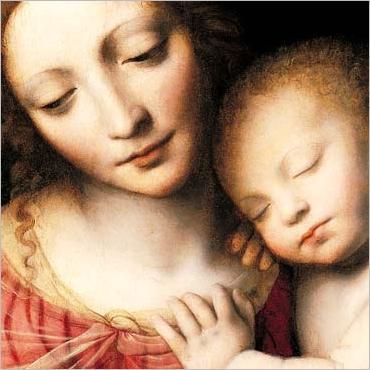
'The Christ Child Asleep' by Bernardino Luigi
How extensively do you plan your novels?
i usually do a page long synopsis, and then a chapter plan telling me what will happen in each chapter. So I usually know before I start exactly how the story is going to end, but sometimes the characters surprise you!
Do you ever use dreams as a source of inspiration?
If I'm in the middle of a book I sometimes will dream about the characters, and if they do (or usually say) something interesting I'll scribble it down when I wake. I always have something with me to write down wherever I am, otherwise the ideas just disappear like bubbles.
Did you make any astonishing serendipitous discoveries while writing this book?
My favourite animal is a giraffe, and I put one in every book. I discovered that Luini's son (also an artist) had put two giraffes at the centre of his Noah's ark fresco in Milan, so I didn't have to figure out how to fit one in!
Where do you write, and when?
I write on my laptop, on the sofa in my living room. I work while the kids are at school, and stop while they're home. It's quite a good chunk of time to write, but it stops me overworking because it's a finite time.
What is your favourite part of writing?
I love it when I have an idea for a scene or some dialogue which I'm so enthusiastic about that I have to write it down so fast that my fingers can't catch up! I also like the editing process, when you have a strong first draft down and then can hone it.
What do you do when you get blocked?
I don't tend to get blocked because I know I have a limited time to write so I just write any old rubbish, because I know I can edit it. Just putting words down on the page makes the process less daunting - there's nothing worse than a blank page.
How do you keep your well of inspiration full?
I read a lot, watch a lot of telly, go to movies, talk to interesting people. There are so many stories to write if you keep your ears open
Do you have any rituals that help you to write?
Not really, except for drinking copious amounts of tea!
Who are ten of your favourite writers?
Thomas Harris, Alexandre Dumas, Evelyn Waugh, Richard Adams, Antonia Forest, Pamela Kaufman, Anya Seton, Shakespeare, Dickens, Jilly Cooper!
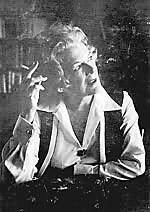
Anya Seton
What do you consider to be good writing?
Writing that makes you want to turn the page, that makes you want to read just one more chapter before you go to sleep.
What is your advice for someone dreaming of being a writer too?
I think if you want to write, you should read. Read everything, good and bad, because you'll learn from both.
Tell me all about your new book.
I'm writing about all of Shakespeare's Italian plays, as if all the characters are real and are living at the same time in Renaissance Italy. Their paths cross and they meet each other, and Shakespeare himself is in it too. It's messing with my head a bit but I'm really enjoying it!
